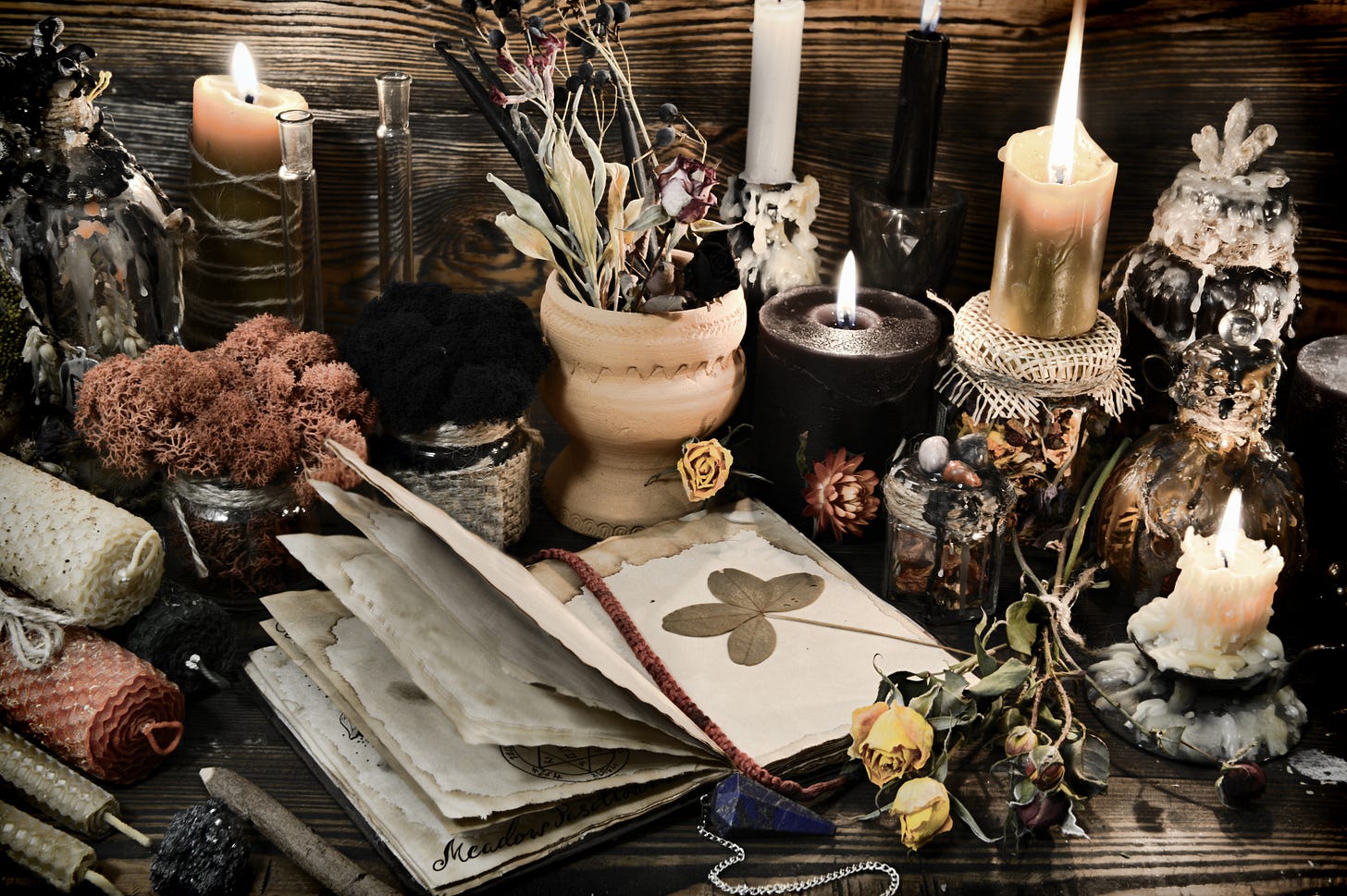I’m always thinking about witches, about history and lore, archetypes and all those quiet, thin moments that exist as flowers bloom and the heat plunges us into a fever-dream-like state. I like to ask my students to consider what (or who) they think of when they hear the word “witch.” Does the word—the name, the title—make them feel nervous, comforted? Does it make them feel empowered, strong? Our relationship with the witch is forever evolving. As I continue working with her and teaching her history, I invite you all to do the same to better understand both violence against women and the oppressive and complex past and present that surrounds and continues to birth the witch.
Below are some of my favorite nonfiction reads to help you on your journey into the occult and the enchanted.
1. Waking the Witch by Pam Grossman
Waking the Witch was instrumental in helping me reframe and rebuild my relationship with the witch. I had been researching archetypes associated with folk horror and the craft for quite some time. Still, my relationship with the witch was something I had personally and professionally wanted to nourish and strengthen over the last few years. Grossman’s book is a treasure trove of history, lore, art, poetry, and power, and I often find myself returning to it for guidance and inspiration, and I often quote it and her in my classes. If you’re working on writing a witchy novel/collection or perhaps looking for something to help you embrace the fire within, I highly recommend picking up a copy of her book in addition to listening to her podcast, The Witch Wave.
2. Witch Hunt: A Traveler’s Guide to the Power and Persecution of the Witch by Kristen J. Solee
I can’t say enough wonderful things about Kristen J. Solee’s work. My first introduction to her was her book Witches, Sluts, Feminists: Conjuring the Sex Positive, and not only did it help me to reshape, revisit, and undo some patriarchal bias and leftover religious teachings that I no longer agreed with, but it also opened my eyes to a different way to connect with women, our choices, and our bodily autonomy. Needless to say, at this point, I was already a huge fan, and so when Witch Hunt: A Traveler’s Guide to the Power and Persecution of the Witch came out, I could not add it to my cart fast enough. Plus, it came out during the height of the pandemic in 2020 and quickly became my vacation and my way to sightsee, learn, and be exposed to different cultures and belief systems without leaving my house. I learned so much reading this book, and my travel list has easily doubled.
3. Literary Witches: A Celebration of Magical Women Writers by Taisia Kitaiskaia
Taisia Kitaiskaia is a brilliant writer and poet, so if she’s not on your radar, you’ll want to get familiar with her work. In 2017, she put out Literary Witches: A Celebration of Magical Women Writers (with artwork by Katy Horan), and this book not only works to introduce us to some of our favorite writers through a different lens but also offers a unique way to analyze how and why we label someone a witch. As I read the biographies and the creative interpretations throughout, I felt better connected to some of my favorite writers while also finding communion with new writers I had yet to explore and know. Plus, as a gorgeous bonus, there is an oracle deck/guidebook that you can also purchase to help foster a relationship with these women and symbols. I use this in my classes a lot, both for introspection and writing exercises, so it’s a great tool to have at your disposal.
4. Witches, Midwives, and Nurses: A History of Women Healers by Barbara Ehrenreich and Deirdre English
I’m fascinated by the intersection of witchcraft and modern medicine. During the pandemic, I studied botany and herbalism (and books like Plant Witchery by Juliet Diaz were and continue to be a fabulous guide). When it came to the history and persecution of healers, though, I wanted something that provided discourse around record and fact, and this book was a fantastic and digestible introduction to the topic. It’s always one of my go-to recommendations when someone is curious about the history of witchcraft and wants to dive deeper and expand their knowledge.
5. Weave the Liminal: Living Modern Traditional Witchcraft by Laura Tempest Zakroff
Laura Tempest Zakroff tackles the liminal in a beautiful, authentic way as she talks about deepening your practice or understanding of modern traditional witchcraft. Something that I’ve appreciated about all of her books is how inclusive and gentle her language is; nothing ever reads as gospel, and there’s always a lot of room for reflection and personal application when it comes to how you specifically want to interpret the material and/or apply it to your life. This is a great guide if you’re looking for something to make your writing (or practice) more authentic, and from a character study perspective, I think this book will help you better bring your witches to life, all while honoring this spiritual path that you’re writing about so you’re not cemented in stereotypes or negative cliches.
Note: An earlier version of this essay was published via LitReactor




